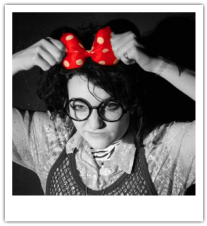|
What was your pathway after school / A level?
I went down the university route after finishing my A-Levels to study Fine Art at Lancaster. Whilst there I ended up minoring in Creative Writing as well to finish with a combined degree in ‘Creative Arts’, which I’m pretty sure is a completely made-up title. I spent two years after graduating trying to decide which career path to take before eventually deciding to pursue my childhood dream of becoming a full-time illustrator.
Do you feel that studying photography at school was a good preparation for these next stages?
Studying Photography - alongside Fine Art - at Tallis was the perfect preparation for a Fine Art degree as it broadened my critical thinking, my historical knowledge, and diversified my skills into digital mediums that became an intrinsic element of my practice at university and beyond. Also, through carrying out projects such as creating album artwork and mood boards, Photography gave me a taste of the more commercial applications my creative skills could have beyond academics.
What key moments - lessons or experiences, within or beyond education - do you consider most significant in your creative development?
I was incredibly quiet in lessons at school but I really came out of my shell on paper. At GCSE level I fell in love with analytical writing, to the point where I self-indulgently once wrote about 12-15 A4 pages analysing the mis-en-scene of the Matrix films. My English teacher wrote when marking it that he was worried the Rainforest was going to run out of trees to keep up with the amount of paper was I using. I had some really fantastic teachers at Tallis and he was one of the most funny and engaging, but he also taught me the valuable lesson of having creative control (i.e. not to be such a show-off). You don’t need to throw everything but the kitchen sink into something to prove that you’re skilled – sometimes restraint and subtlety is just as effective, and that lesson is something that has really stuck with me.
What is your job/role now? What does this involve?
At the moment I am a freelance illustrator, which is both exciting and terrifying. It’s exciting in that I can work the hours I want, wherever I want, whilst doing my dream job, but it’s scary as there’s no one automatically paying you a salary every month. You’ve got to have the drive to make business for yourself. The best days are when I can sit at my drawing board working with Netflix in the background and no disturbances like a typical shut-away artist. On other days I have to be more sociable to get more business, such as doing self-promotion online, applying for competitions, grants, and jobs, going to events, and – most importantly – meeting with potential clients.
My ongoing jobs are illustrations for the comic book series ‘Age of Revolution’ for Cosmic Anvil; a newspaper comic strip called ‘The Astonishing Adventures of Lemon’ead & Beefy’ for the CDF; and a children’s book for a local author. I am currently represented by Inky Illustration Agency.
Any further ambitions / hopes / next steps?
My next steps are to get longer lasting and higher paid jobs. I work with individuals on small one-off projects mainly, so this year I’d like to score some bigger jobs from publishers or organisations to build up my portfolio and skill set. Ultimately I just want to be busy – being busy means more work, and more work means more drawing, which is the only thing I really want to be doing!
Do you have any advice to students that might aspire to follow a similar pathway?
I became a little disillusioned after university. I graduated with exactly the kind of degree I wanted and I thought it would be enough to walk into any creative job. Instead, I was unemployed for 9 months and got very depressed, but during that time I still worked as much as I could. I volunteered in the Fashion & Textile Museum in London, and did work experience in two publishing houses and the V&A. Eventually, I expanded my job search criteria to ‘anything that pays’ and landed an office job at a charity where I stayed for over a year, scrimping and saving, until I decided I could afford to take the jump into self-employment as an illustrator. If someone wouldn’t give me a job, I thought I’d try creating one for myself.
Although I wasn’t doing what I wanted in those two years after graduating, the charity job gave me a valuable taste of the ‘real’ world after living in the bauble of university, and the volunteering I did granted me ‘insider’s access’ to the commercial creative industry and some really good advice on how to build my portfolio and approach clients.
My advice to others that want to follow a similar pathway is to not assume that the learning curve stops when you leave education. You need to know the industry you want to be a part of so take any experience or advice you can get, even if it means you end up taking an unexpected detour off your career plan. If you want to be a freelancer, it’s vital that you make the leap at the right time and find out what help is available to you before you do it. For example, as well as setting aside emergency money, I’ve been on loads of business courses courtesy of the Welsh Government (I live in South Wales) and receive a self-employment allowance from the job centre which I’d been completely unaware existed until I spoke to another self-employed person who was receiving the allowance.
I went down the university route after finishing my A-Levels to study Fine Art at Lancaster. Whilst there I ended up minoring in Creative Writing as well to finish with a combined degree in ‘Creative Arts’, which I’m pretty sure is a completely made-up title. I spent two years after graduating trying to decide which career path to take before eventually deciding to pursue my childhood dream of becoming a full-time illustrator.
Do you feel that studying photography at school was a good preparation for these next stages?
Studying Photography - alongside Fine Art - at Tallis was the perfect preparation for a Fine Art degree as it broadened my critical thinking, my historical knowledge, and diversified my skills into digital mediums that became an intrinsic element of my practice at university and beyond. Also, through carrying out projects such as creating album artwork and mood boards, Photography gave me a taste of the more commercial applications my creative skills could have beyond academics.
What key moments - lessons or experiences, within or beyond education - do you consider most significant in your creative development?
I was incredibly quiet in lessons at school but I really came out of my shell on paper. At GCSE level I fell in love with analytical writing, to the point where I self-indulgently once wrote about 12-15 A4 pages analysing the mis-en-scene of the Matrix films. My English teacher wrote when marking it that he was worried the Rainforest was going to run out of trees to keep up with the amount of paper was I using. I had some really fantastic teachers at Tallis and he was one of the most funny and engaging, but he also taught me the valuable lesson of having creative control (i.e. not to be such a show-off). You don’t need to throw everything but the kitchen sink into something to prove that you’re skilled – sometimes restraint and subtlety is just as effective, and that lesson is something that has really stuck with me.
What is your job/role now? What does this involve?
At the moment I am a freelance illustrator, which is both exciting and terrifying. It’s exciting in that I can work the hours I want, wherever I want, whilst doing my dream job, but it’s scary as there’s no one automatically paying you a salary every month. You’ve got to have the drive to make business for yourself. The best days are when I can sit at my drawing board working with Netflix in the background and no disturbances like a typical shut-away artist. On other days I have to be more sociable to get more business, such as doing self-promotion online, applying for competitions, grants, and jobs, going to events, and – most importantly – meeting with potential clients.
My ongoing jobs are illustrations for the comic book series ‘Age of Revolution’ for Cosmic Anvil; a newspaper comic strip called ‘The Astonishing Adventures of Lemon’ead & Beefy’ for the CDF; and a children’s book for a local author. I am currently represented by Inky Illustration Agency.
Any further ambitions / hopes / next steps?
My next steps are to get longer lasting and higher paid jobs. I work with individuals on small one-off projects mainly, so this year I’d like to score some bigger jobs from publishers or organisations to build up my portfolio and skill set. Ultimately I just want to be busy – being busy means more work, and more work means more drawing, which is the only thing I really want to be doing!
Do you have any advice to students that might aspire to follow a similar pathway?
I became a little disillusioned after university. I graduated with exactly the kind of degree I wanted and I thought it would be enough to walk into any creative job. Instead, I was unemployed for 9 months and got very depressed, but during that time I still worked as much as I could. I volunteered in the Fashion & Textile Museum in London, and did work experience in two publishing houses and the V&A. Eventually, I expanded my job search criteria to ‘anything that pays’ and landed an office job at a charity where I stayed for over a year, scrimping and saving, until I decided I could afford to take the jump into self-employment as an illustrator. If someone wouldn’t give me a job, I thought I’d try creating one for myself.
Although I wasn’t doing what I wanted in those two years after graduating, the charity job gave me a valuable taste of the ‘real’ world after living in the bauble of university, and the volunteering I did granted me ‘insider’s access’ to the commercial creative industry and some really good advice on how to build my portfolio and approach clients.
My advice to others that want to follow a similar pathway is to not assume that the learning curve stops when you leave education. You need to know the industry you want to be a part of so take any experience or advice you can get, even if it means you end up taking an unexpected detour off your career plan. If you want to be a freelancer, it’s vital that you make the leap at the right time and find out what help is available to you before you do it. For example, as well as setting aside emergency money, I’ve been on loads of business courses courtesy of the Welsh Government (I live in South Wales) and receive a self-employment allowance from the job centre which I’d been completely unaware existed until I spoke to another self-employed person who was receiving the allowance.

